Integrating academic foundations
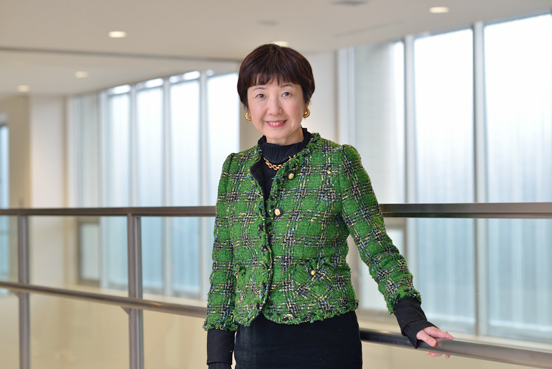
An interview with
Eriko Ishida Kawai
Professor
Shishu-Kan Graduate School
Hearing, Thinking, Practicing
Launched in 2012, Kyoto University's Shishu-Kan is a one-of-a-kind graduate school, providing students the freedom to explore a broad spectrum of fields ranging from medical science, engineering, and information science to economics, law, and the humanities, and to think deeply and widely about contemporary issues facing societies around the world.
Eriko Ishida Kawai, Professor at Shishu-Kan, is part of a multidisciplinary faculty dedicated to fostering the next generation of global thinkers and doers. With her background in finance and experience at international organizations, Kawai now specializes in teaching communication skills essential for top-level negotiation, debate, and presentation. Here she talks about the advantages of studying and working in Kyoto, the opening of Shishu-Kan's new premises, and what it takes to succeed on the global stage.
First of all, could you please describe your current role at Shishu-Kan?
Kawai: My work at Shishu-Kan primarily involves advising graduate students about their future career paths and options. This year, I'm teaching communication skills to first-year to third-year students. I think there is a gap between Japanese students and overseas students in terms of their focus on developing leadership skills. I aim to help bridge this gap and encourage students who are prepared to take up new challenges.
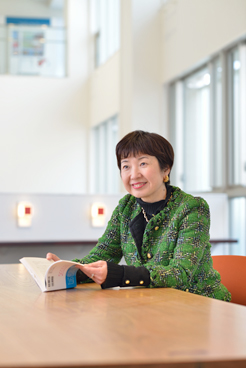
Prof Kawai is part of a multidisciplinary faculty at Shishu-Kan Graduate School
In your view, what makes Shishu-Kan different to other graduate schools?
Kawai: One of the main goals of Shishu-Kan is to enable students to learn from a truly wide range of fields and faculties spanning the humanities, law, economics, science, agriculture, engineering, informatics, and medical and life science. To this end, Shishu-Kan offers unique modes of study, such as Jukugi (熟議, industry-government cooperation special seminars) and Hasshi (八思, lectures on integrated academic foundations). These classes are designed to promote multidisciplinary thinking and students can benefit from learning directly from industry, government, finance, and education leaders.
The name Shishu-Kan derives from mon-shi-shu, which literally means "hearing, thinking, practicing". All of the programs at Shishu-Kan place emphasis on gaining practical experience and understanding real-world issues. First-year students undertake domestic internships, for example, at welfare facilities in cooperation with local governmental bodies in and around Kyoto. Second-year students can conduct internships overseas, for example, by joining various Japan International Cooperation Agency (JICA) projects. In their third and fourth year, students deepen their understanding of cultures and perspectives in diverse settings and learn how to formulate policies, implement their ideas, and develop their negotiation skills. Fifth-year students focus on conducting project-based research and are expected to complete a doctoral thesis. In this way, Shishu-Kan offers one of only a few doctoral programs in Japan to cover such a comprehensive five-year program based on tailor-made curricula.
I understand that you obtained a Bachelor of Arts at Harvard University and a Master of Business Administration at INSEAD in France. Could you please describe your experiences at these institutes?
Kawai: At Harvard, I was actually the first student to attend from a public high school in Japan. In those days, I think I was always studying to catch up, without spending much time on extracurricular activities. Other students did drama and sports, but I spent nearly all of my time on study. On reflection, I can see that balancing academic and non-academic activities is important. At INSEAD, I recall there were many assignments and group study sessions held in the evenings. These study groups were made up of people with very different backgrounds, in engineering, law, accounting, and so forth. I think this format encouraged everybody to communicate and develop a "can do" approach.
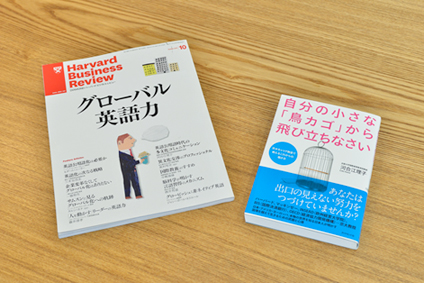
A selection of Prof Kawai's published works
What have been the biggest challenges in your career?
Kawai: One of the biggest challenges has been learning how to manage transitions. In my experience, changing career has involved living in different countries and learning new languages. During my time as a consultant at McKinsey in Paris, I learned not to be afraid. Beginning is always difficult -- the first three to six months is always hard. Perhaps now I have learned how to adapt myself to different environments. My thoughts on globalization and the need to communicate effectively in English were published in Harvard Business Review. I also wrote a book about the need to break out of a "birdcage" mentality. The book encourages readers to think about all possibilities rather than limiting themselves, and to have the courage to explore new horizons.
What would be your advice to those currently facing new transitions and career challenges?
Kawai: It's important never to give up. Focus on success, not on failure or shortcomings. Accept the fact that no one is perfect, learn from everyone, and be open-minded. In Japan, sometimes negotiation is viewed as a bad thing, in the sense that persuading somebody can create a lose-or-win situation. However, good negotiation can create win-win situations.
I also think that learning from theory is not enough. That's why I advise my students to learn from practice; collect as much information as possible and, most importantly, know what you want. That's the real art of negotiation -- understanding the minimum and the maximum, and finding something in between. I'm planning new classes that involve discussing real-life cases where negotiation is critical.
In your view, what are some of the key characteristics needed to succeed on the global stage?
Kawai: Communication skills and being able to adapt to change are essential. Also, I would advise my students that having curiosity, networking with diverse people, and engaging in teamwork projects are all equally important. Transferable skills, for example at UK universities, are also currently a hot topic. I would advise students to consider many different options and develop core professional skills.
I understand that you served as moderator for The Third Global Collaboration Symposium on Human Survivability: An Initiative of Global Leaders. Could you please tell us more about it?
Kawai: Yes, the symposium was held at Kyoto University Shiran-Kaikan on 21 November 2014. It came about as a way to stimulate discussion about global issues such as the environment, global warming, water, food, poverty, and education. We invited speakers from international organizations including the OECD, UNEP, FAO, and UNESCO. We also invited panelists from NGOs including BRAC and the NPO International Institute of Global Resilience. We discussed current activities, common issues of concern, and possible areas of collaboration between different sectors. The event provided excellent opportunities for students to engage in discussions about current issues and to develop new perspectives. We are planning to host another symposium in 2015.
What would be your advice to students based overseas who are interested in applying for graduate studies at Kyoto University?
Kawai: It's worth bearing in mind that the University is now actively focusing on efforts to promote internationalization. I understand that there are good scholarship opportunities for students overseas. There are an increasing number of English-taught degree programs and various workshops and classes conducted in English at Kyoto University.
In your view, what are the advantages of being based in Kyoto?
Kawai: From a cultural perspective, Kyoto offers unparalleled opportunities to explore temples and gardens and observe traditional arts. Unlike larger cities such as Tokyo or New York, you can virtually go anywhere in Kyoto if you have a bicycle. It's very eco-friendly. I would encourage anyone who visits Kyoto to explore the culture, history, and architecture by bike and on foot.
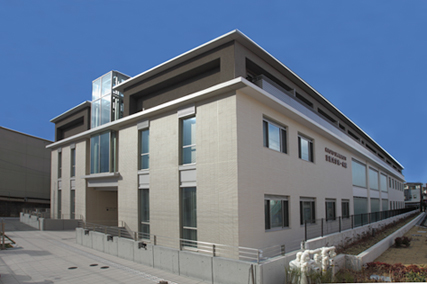
Kyoto University's Higashi-ichijo-Kan opened in late February 2015, providing new facilities for graduate education and research
And finally, could you please comment on Shishu-Kan's brand new premises on Higashi-ichijo dori?
Kawai: This is a new beginning for our graduate school. We are so excited about moving to this beautiful new building, Higashi-ichijo-Kan, which officially opened on 24 February 2015. It was formerly the site of Kyoto city's Sakyo Ward Office. We will be sharing these premises with Kyoto University's Design School and other graduate programs related to sustainable development, medical science, and primatology and wildlife studies. There's a new seminar room, a library, a discussion area on the ground floor, teaching rooms, offices for faculty, and bright, open spaces designed to promote interaction. I think the building provides an excellent new foundation for both teaching and research.
Published: 17 March 2015
Profile
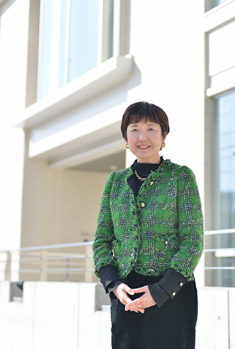
Eriko Ishida Kawai has over 30 years of experience working and studying in Europe and the United States. After obtaining a Bachelor of Arts from Harvard University and a Master of Business Administration from INSEAD, Prof Kawai worked for international organizations including the Organization for Economic Cooperation and Development (OECD) in Paris, France, and the Bank for International Settlements (BIS) in Basel, Switzerland. She joined Kyoto University's Institute for Liberal Arts and Sciences in April 2012 and currently teaches communication skills for global contexts in English.
Further information
Kyoto University Research Administration Office (KURA)

